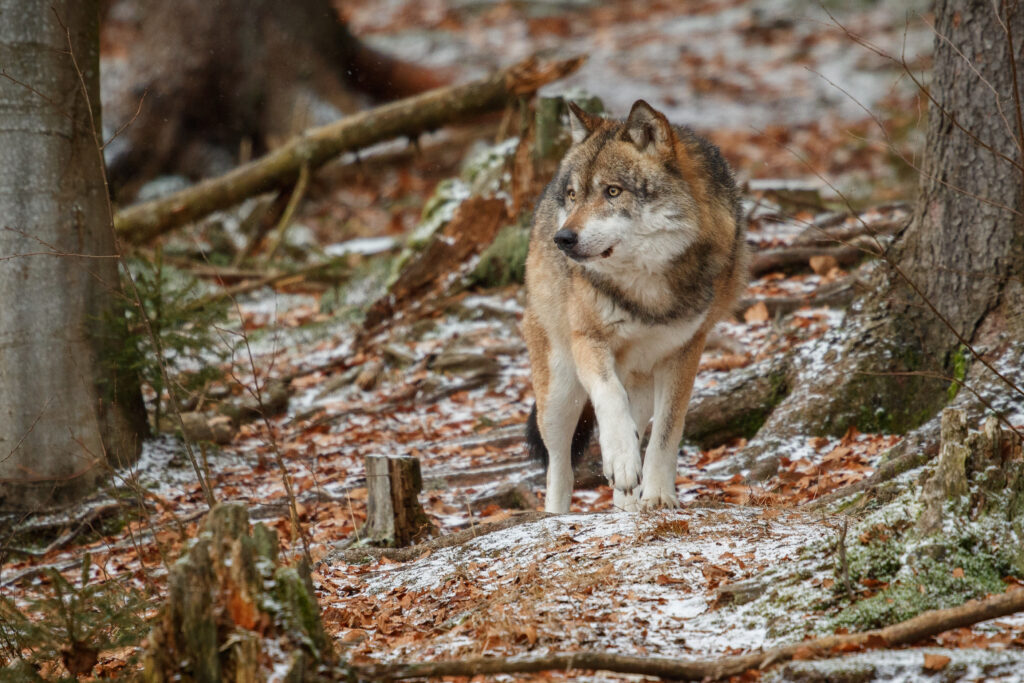Wolves at a Crossroad: Conservation and Coexistence Challenges in the EU
Author: Delphine DUPEUX, Director of Parliament Relations Intergroup, ELO
Europe’s wolves are back – and their return is sparking one of the most dynamic and complex conservation debates in recent History. Once nearly extinct, wolf populations have made a remarkable comeback, thanks to decades of strict protection under the EU Habitats Directive. Their resurgence is now testing the limits of coexistence in many rural regions. This ignites urgent questions about how to balance biodiversity goals with the realities of agriculture.
A Shift in EU Policy: Flexibility over Rigidity
On 9 April 2025, the European Parliament’s “Biodiversity, Hunting, Countryside” intergroup hosted a high-profile online event – Downlisting the Wolf: A Way Forward for the EU – co-organized with the European Federation for Hunting and Conservation (FACE). Over 250 stakeholders, including lawmakers, scientists, farmers, and conservationists, gathered to discuss the key policy proposal to adjust the wolf’s protection status from “strictly protected” to “protected” under the Bern Convention.
The European Commission argues that this policy recalibration will enable member states to adopt more flexible, region-specific management tools without abandoning the EU’s overarching conservation obligations. MEPs Juan Ignacio ZOIDO and Herbert DORFMANN strongly endorsed the proposal. They stress that national authorities need practical tools to address growing human-wildlife conflicts, especially in pastoral areas.
Flexibility with Responsibility
Andrea VETTORI, head of biodiversity at DG Environment, reiterated that maintaining a favourable conservation status remains a legal requirement. However, he emphasized that flexibility is essential to meet diverse regional realities. John LINNELL, senior researcher at the Norwegian Institute for Nature Research, described the move as a “new phase in wolf conservation” – one that calls for adaptive management, ongoing monitoring, and shared responsibility across governance levels.
From the agricultural sector, Copa-Cogeca’s Niall CURLEY advocated for science-based, balanced policies that both protect nature and secure rural livelihoods, including proper compensation mechanisms.
The Debate is Far from Settled
Not all voices support the downlisting. Friedrich WULF of Friends of the Earth Europe questioned the scientific rationale for loosening protections, warning that some wolf populations remain in an unfavourable state. He cautioned that unmanaged flexibility could backfire, leading to increased conflict and undermining conservation gains. He urged member states to reinforce non-lethal prevention strategies and retain strict protections where ecologically justified.
ELO’s Leadership on Practical Coexistence
ELO has emerged as a pivotal actor in this policy landscape. Dr. Jurgen TACK, who moderated the Intergroup event, emphasized the need for a clear, science-driven definition of conservation success to avoid unnecessary polarization and foster constructive dialogue. As a partner in the Horizon Europe COCO (Coexisting with Carnivores) project, which promotes tailored coexistence strategies in rural landscapes across Europe, ELO is increasing its implication to find adequate solutions.
Further cementing its role, ELO co-chairs the EU Platform on Coexistence between People and Large Carnivores, a crucial forum for stakeholder engagement and policy alignment. Recently, ELO took part in the Dinaric-Balkan-Pindos platform meeting in Ioannina, Greece, which tackled regional challenges in southeastern Europe. Furthermore, ELO is invited in the framework of the EU Platform to the International Wolf Ecology and Management Conference (2–6 June, Lunteren, Netherlands), where it will co-host workshops on cross-border cooperation and the development of regional platforms.
Why This Matters Now
What’s unfolding is not just a debate about wolves – it’s a test case for how the EU manages ecological recovery in a densely populated, multi-use landscape. Can Europe create policies that are at once science-based, socially acceptable, and regionally adaptable?
This moment marks a turning point. Engaging with these developments isn’t just important – it’s essential for anyone interested in environmental governance, biodiversity strategy, or the socio-ecological fabric of rural Europe.


